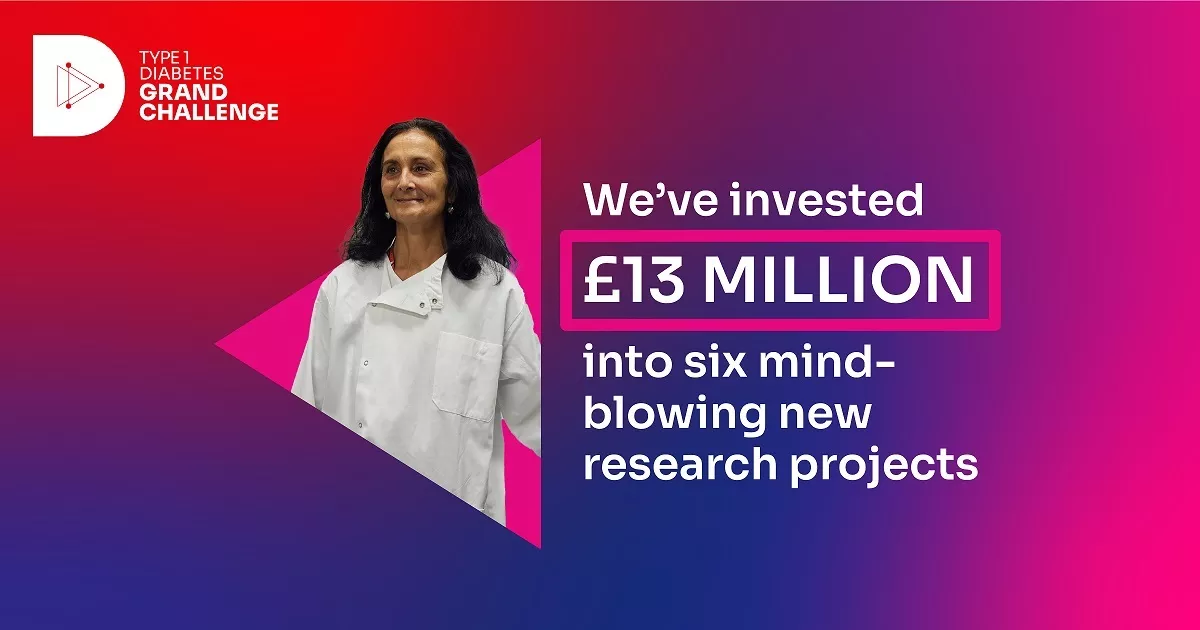
Almost £5 million has been awarded to scientists at King’s College London to help find a cure for type 1 diabetes.
Today the Type 1 Diabetes Grand Challenge, a ground-breaking partnership between the Steve Morgan Foundation, Diabetes UK and JDRF UK, has announced £4.8 million funding for two major research projects in London, in a bid to find a cure for type 1 diabetes.
Leading scientists at King’s College London are among six UK teams who have been awarded prestigious grants totalling over £13 million. This investment comes thanks to the historic £50 million pledge from the Steve Morgan Foundation to accelerate promising research that could unlock life-changing new treatments for type 1 diabetes.
Type 1 diabetes is an autoimmune condition that occurs when the body’s immune system attacks the insulin-producing cells of the pancreas. This means the pancreas can no longer produce insulin, leading to high blood sugar levels. More than 400,000 people in the UK are living with type 1 diabetes, including around 58,000 people in London.
Turning stem cells into beta cells
The new Type 1 Diabetes Grand Challenge research led by King’s College London will innovate ways to restore insulin-producing beta cells that have been destroyed in people with type 1 diabetes, so the body can make its own insulin again.
Working to create an unlimited supply of elite lab-made beta cells that can deftly respond to changing blood sugar levels and are well equipped to survive transplantation will be the mission of Professor Shanta Persaud and Dr Aileen King’s team, led from King’s College London.
They will utilise their team’s expertise in human beta cell development and function to innovate improved methods of turning stem cells into beta cells.
Dr Aileen King said:
“People with type 1 diabetes have to constantly think about their blood glucose levels and adjust their insulin doses in response. Our aspiration is to produce fully functioning beta cells suitable to implant into people living with type 1 diabetes, which do this on their behalf.
“This would be transformative for people with the condition, as it would restore the body’s minute-to-minute insulin production that is required to carefully control blood glucose levels – reducing the risk of dangerous blood sugar lows and long-term diabetes complications, while also reducing the huge psychological impact of living with diabetes.”
Professor Francesca Spagnoli, also at King’s College London, will lead another multidisciplinary team concentrating on keeping transplanted beta cells, made from stem cells, safe from harm.
This will include developing a synthetic microenvironment that beta cells can live inside, boosting their long-term survival and protecting them from the hostile environment they will face once inside the body.
Professor Spagnoli said:
“The Type 1 Diabetes Grand Challenge funding means we can explore new avenues in diabetes research. We’ll be able to start moving some of our discoveries closer to clinical applications and drive improvements in cell replacement therapies, which could ultimately cure type 1 diabetes.”
Dr Elizabeth Robertson, Director of Research at Diabetes UK, said:
“We’re in a hugely exciting period for the Type 1 Diabetes Grand Challenge, as today we welcome more exceptional scientists who will lead multi-disciplinary teams to drive forward to this pioneering initiative and build momentum towards our ambitious goal.
“The research we’re getting underway in London and elsewhere brings with it fresh hope of a cure for everyone living with type 1 diabetes. Treatments that restore insulin-producing cells would take us into a new era in type 1 diabetes, where people are freed from the relentless task of managing blood sugar levels and thinking like their pancreas 24/7. We look forward to seeing how this research will break new ground and help us to reach this day sooner.”
Rachel Connor, Director of Research Partnerships at JDRF UK, said:
“Today’s announcement of six newly funded research projects demonstrates the speed and ambition of the Type 1 Diabetes Grand Challenge. All six projects hold great promise for people with type 1 diabetes. We can’t wait to see the results of this vital research to transform beta cell therapy and tackle the immune reaction that is at the root of driving type 1.”
Steve and Sally Morgan, Founders of the Steve Morgan Foundation, said:
“This is an exciting moment in our partnership with Diabetes UK and JDRF UK. We are astounded by the innovation and vision of the new projects and look forward to seeing how the research could help to deliver tangible transformations for people living with type 1 diabetes.”
What is the Type 1 Diabetes Grand Challenge?
The Type 1 Diabetes Grand Challenge was established following the Steve Morgan Foundation’s generous £50 million donation to fund type 1 diabetes research. Over five years the Type 1 Diabetes Grand Challenge is funding collaborative research with the greatest potential to lead to life-changing new treatments
So far, over £18 million has been allocated to exceptional research teams in the UK, who are leading the race towards a cure for type 1 diabetes.
Summaries of each newly funded project can be found here.
